Daily Vocabulary Words: List of Daily Used Words in Leading International Newspapers
Hi there. Welcome to this special section @ Wordpandit.
Our endeavour here is very simple: to highlight important daily vocabulary words, which you would come across in leading newspapers in the country. We have included the following newspapers in our selection:
• The New York Times
• The Washington Post
• Scientific American
• BBC
• The Guardian
• Psychology Today
• Wall Street Journal
• The Economist
We are putting in extensive work for developing your vocabulary. All you have got to do is be regular with this section and check out this post on a daily basis. This is your repository of words that are commonly used and essentially, we are posting a list of daily used words. Hence, this has significant practical application as it teaches you words that are used commonly in leading publications mentioned above.
Visit the website daily to learn words from leading international newspapers.
WORD-1: LAGGING
CONTEXT: the American economy is far too dependent on China for critical supplies while imports from countries in our hemisphere, aside from Canada and Mexico, are lagging, experts say.
SOURCE: New York Times
EXPLANATORY PARAGRAPH: Lagging is like when you are playing a game with your friends, but you are a little slower than them. You might lag behind, meaning you are not moving as fast or keeping up as well as the others.
MEANING: Moving slowly or falling behind (verb).
PRONUNCIATION: LAG-ing
SYNONYMS: Trailing, falling behind, delaying, lingering, dawdling
USAGE EXAMPLES:
1. The turtle was lagging behind the other animals in the race.
2. The project was lagging due to a lack of resources.
3. Don’t lag behind, try to keep up with the group.
4. The slow internet connection caused the video to lag during streaming.
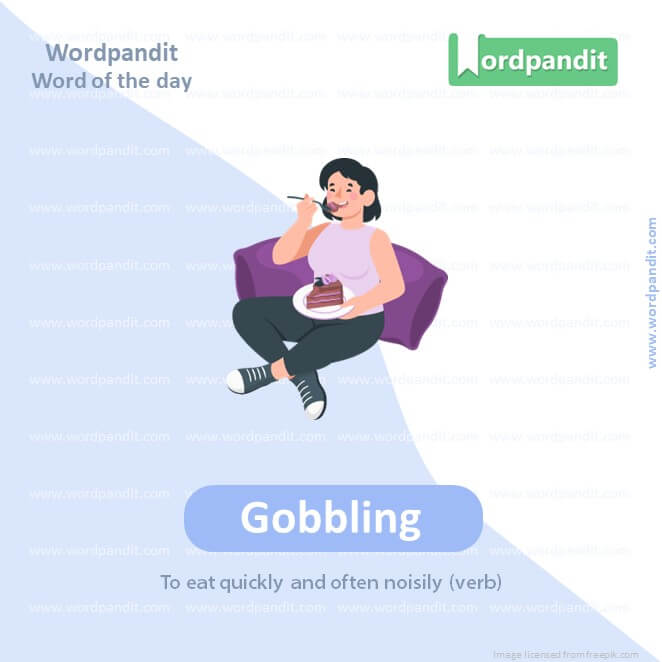
WORD-2: GOBBLING
CONTEXT: Intel has been expanding ever since, gobbling up space that used to be a cafeteria.
SOURCE: New York Times
EXPLANATORY PARAGRAPH: Gobbling is what turkeys do when they eat quickly and noisily, swallowing their food in big bites. It’s like when you’re very hungry and eat your food really fast, making loud eating sounds.
MEANING: To eat quickly and often noisily (verb)
PRONUNCIATION: GOB-ling
SYNONYMS: Devouring, gulping, wolfing down, consuming, munching
USAGE EXAMPLES:
1. The kids were gobbling up the pizza at the party.
2. The hungry dog was gobbling its food without pausing.
3. She was gobbling down her sandwich as if she hadn’t eaten in days.
4. The birds were gobbling the seeds scattered on the ground.
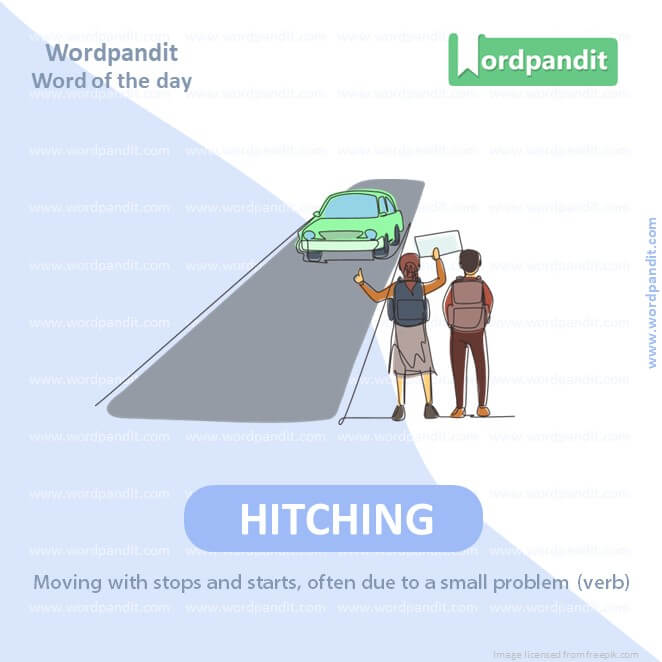
WORD-3: HITCHING
CONTEXT: Donald Trump is someone you should think carefully about hitching your financial fortunes to.
SOURCE: New York Times
EXPLANATORY PARAGRAPH: Hitching is like when you’re riding a bike and suddenly stop because something on your bike isn’t working right. It’s when you have a little problem that stops you from moving smoothly.
MEANING: Moving with stops and starts, often due to a small problem (verb).
PRONUNCIATION: HITCH-ing
SYNONYMS: Jerking, jolting, halting, stopping, pausing
USAGE EXAMPLES:
1. The car kept hitching along the bumpy road.
2. His speech was hitching because he was nervous.
3. The old machine kept hitching and needed repairs.
4. The movie playback was hitching due to a slow internet connection.
WORD-4: UNSCATHED
CONTEXT: Declaring corporate bankruptcy seems to be one of his favorite hobbies. And even when he wriggles away from failure largely unscathed, the other parties involved aren’t always so fortunate.
SOURCE: New York Times
EXPLANATORY PARAGRAPH: Unscathed means you come out of something without any scratches or injuries, like when you play a game and don’t get hurt at all.
MEANING: Without suffering any harm or damage (adjective).
PRONUNCIATION: un-SKAYTHD
SYNONYMS: Unharmed, untouched, undamaged, unhurt, intact
USAGE EXAMPLES:
1. Despite the accident, he came out of it unscathed.
2. The building survived the storm unscathed.
3. She emerged from the conflict unscathed, both physically and emotionally.
4. The treasure remained hidden and unscathed for centuries.
WORD-5: WRIGGLES
CONTEXT: Declaring corporate bankruptcy seems to be one of his favorite hobbies. And even when he wriggles away from failure largely unscathed, the other parties involved aren’t always so fortunate.
SOURCE: New York Times
EXPLANATORY PARAGRAPH: Wriggles are those little movements you make when you’re trying to get comfortable or when you’re excited about something. It’s like when you wiggle around in your seat because you’re happy or can’t sit still.
MEANING: Moving with small, quick, twisting movements (verb).
PRONUNCIATION: RIG-uhlz
SYNONYMS: Squirms, squiggles, writhes, twists, fidgets
USAGE EXAMPLES:
1. The baby wriggled in her mother’s arms, trying to break free.
2. The fish wriggled out of the fisherman’s grasp.
3. He couldn’t stop wriggling with excitement during the performance.
4. The snake wriggled through the grass, trying to escape.
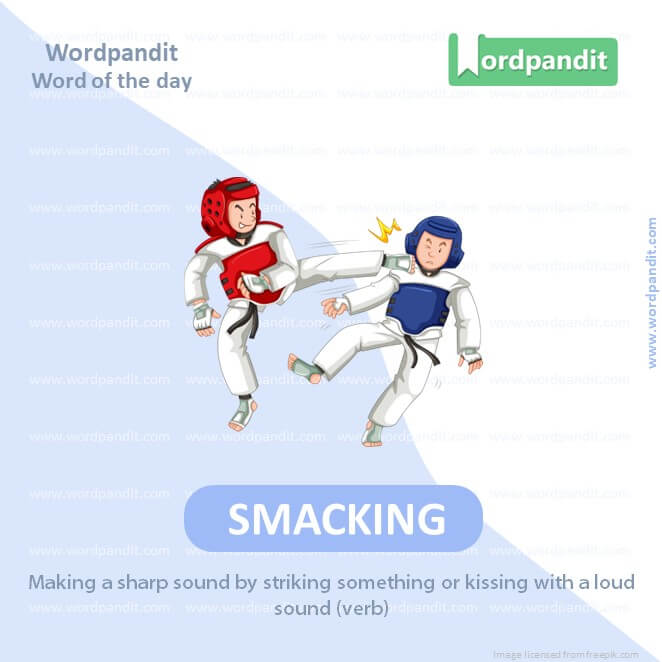
WORD-6: SMACKING
CONTEXT: The red flags are smacking you in the face. Wake up and smell the grift!
SOURCE: New York Times
EXPLANATORY PARAGRAPH: Smacking is the sound you make when you hit something with your hand or lips. It’s like when you clap your hands together loudly or make a kissing sound.
MEANING: Making a sharp sound by striking something or kissing with a loud sound (verb).
PRONUNCIATION: SMAK-ing
SYNONYMS: Hitting, clapping, kissing, slapping, banging
USAGE EXAMPLES:
1. He was smacking his lips after tasting the delicious dessert.
2. The door kept smacking against the wall in the strong wind.
3. She heard the sound of smacking as the kids played with their toys.
4. The chef was smacking the dough to flatten it.
WORD-7: SQUABBLE
CONTEXT: Other candidates and committees are an afterthought, left to squabble over his scraps.
SOURCE: New York Times
EXPLANATORY PARAGRAPH: Squabble is like when you and your friend argue over who gets to play with a toy first. It’s a small, noisy argument that’s not very serious.
MEANING: A noisy argument, especially about something unimportant (noun).
PRONUNCIATION: SKWA-buhl
SYNONYMS: Argument, disagreement, dispute, quarrel, spat
USAGE EXAMPLES:
1. The siblings were always having squabbles over trivial things.
2. The meeting turned into a squabble over office supplies.
3. They had a squabble about whose turn it was to wash the dishes.
4. The politicians engaged in a heated squabble during the debate.
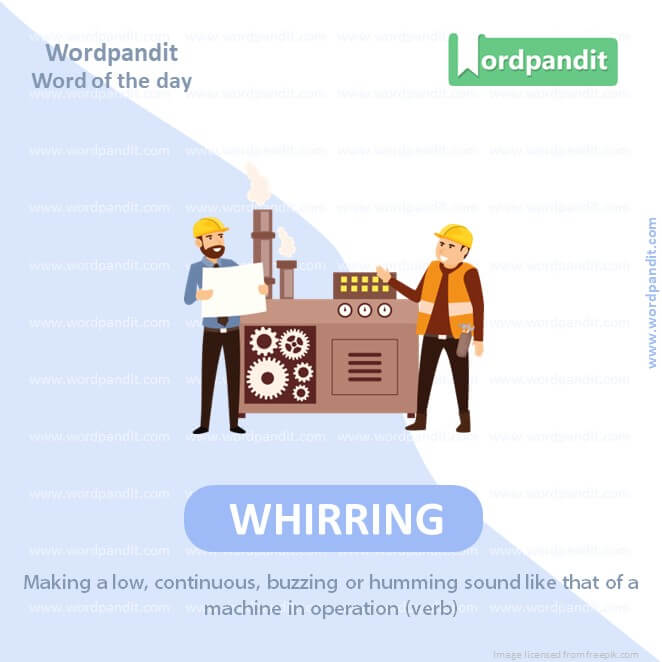
WORD-8: WHIRRING
CONTEXT: Which might not be problematic if the party’s money machine were whirring along smoothly.
SOURCE: New York Times
EXPLANATORY PARAGRAPH: Whirring is the sound you hear when something is spinning or rotating very fast, like when a fan or a machine is running quickly.
MEANING: Making a low, continuous, buzzing or humming sound like that of a machine in operation (verb).
PRONUNCIATION: WUR-ing
SYNONYMS: Buzzing, humming, droning, whizzing, purring
USAGE EXAMPLES:
1. The engine’s whirring could be heard from a distance.
2. The windmill’s blades were whirring in the breeze.
3. The computer’s fan started whirring loudly after hours of use.
4. She could hear the sound of whirring machinery in the factory.
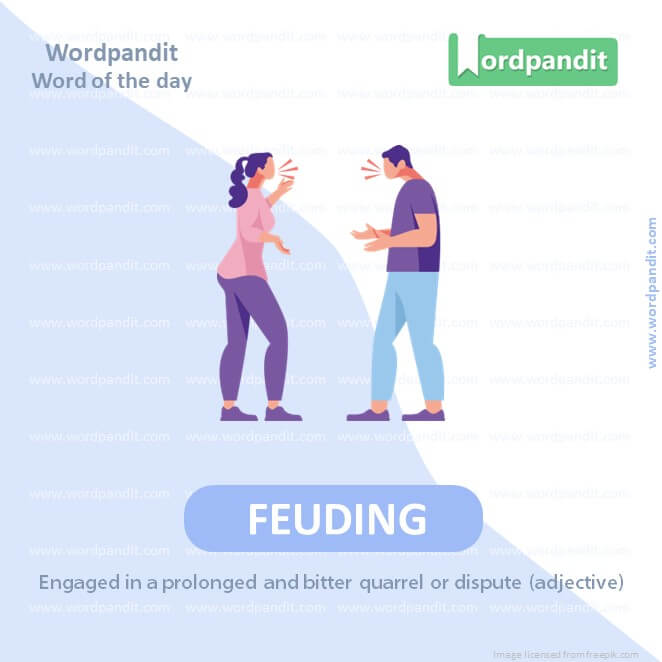
WORD-9: FEUDING
CONTEXT: Rarely has a political party been more desperately in need of a leader who can calm the waters, unify the feuding factions and charm the money men and women.
SOURCE: New York Times
EXPLANATORY PARAGRAPH: Feuding is like when two groups of people or families are always arguing or fighting with each other, often over something that happened in the past.
MEANING: Engaged in a prolonged and bitter quarrel or dispute (adjective).
PRONUNCIATION: FYOO-ding
SYNONYMS: Quarreling, fighting, arguing, bickering, clashing
USAGE EXAMPLES:
1. The feuding families refused to speak to each other for years.
2. The feuding neighbors argued over property boundaries.
3. The feuding tribes had a long history of conflict.
4. The feuding siblings couldn’t agree on how to divide their inheritance.
WORD-10: REFLEXIVE
CONTEXT: There was also an element of reflexive opposition to government spending in general, no matter how obvious the need.
SOURCE: New York Times
EXPLANATORY PARAGRAPH: Reflexive is when something happens automatically, like when you touch something hot and immediately pull your hand away without thinking.
MEANING: Done as an automatic response, without conscious thought (adjective).
PRONUNCIATION: ree-FLEK-siv
SYNONYMS: Automatic, instinctive, involuntary, spontaneous, unconscious
USAGE EXAMPLES:
1. His reflexive action saved him from falling off the bike.
2. The cat’s reflexive response was to arch its back when startled.
3. She had a reflexive urge to apologize even though it wasn’t her fault.
4. The reflexive movement of the plants towards the sunlight is called phototropism.
Vocabulary Importance
In the realm of language learning, understanding ‘vocabulary importance’ is a fundamental concept. Words are the building blocks of language and a rich vocabulary fuels effective and persuasive communication. However, embracing ‘vocabulary importance’ involves more than just acknowledging its role – it requires you to integrate it into your learning strategy.
To truly grasp ‘vocabulary importance’, expose yourself to a variety of reading and listening activities. Whether it’s reading novels, engaging with podcasts, or watching films in your the profound impact of having a robust vocabulary arsenal and will illuminate the practical ‘vocabulary importance.’
Additionally, recognizing ‘vocabulary importance’ necessitates an active approach to vocabulary acquisition. Regularly dedicate time to learning new words. Use flashcards, word lists, language apps, or even set a ‘word of the day’ to maintain a steady flow of vocabulary learning.
Incorporating the learnt vocabulary into your speech and writing is non-negotiable when understanding ‘vocabulary importance’. Regular usage not only enhances vocabulary retention, but it also uncovers the magic of eloquent expression that a blossoming vocabulary can yield.
It’s also beneficial to lean on memory aids in recognizing ‘vocabulary importance’. Associating words with images, stories or personal anecdotes creates strong memory hooks, enhancing vocabulary recall and solidifying the understanding of ‘vocabulary importance’.
To sum it up, ‘vocabulary importance’ is not just a theory to be noted, but a mantra to be embraced in your language learning journey. Engage with a wide variety of resources, actively learn and use new words, and utilize effective recall techniques. As you uncover the depths of ‘vocabulary importance’, you’ll realize that every new word is a fresh shade on your language palette, painting your communication canvas with hues of eloquence, clarity, and confidence.











